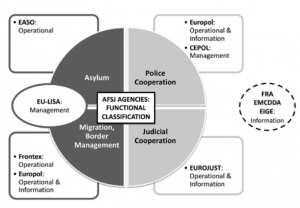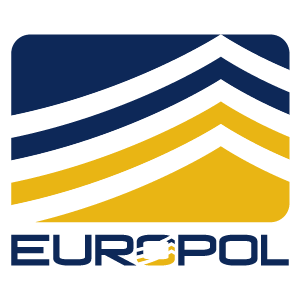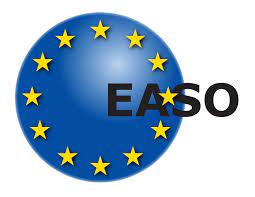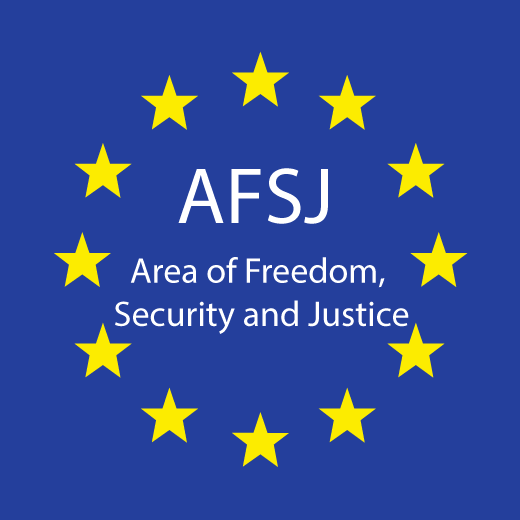AFSJ stands for the Area of Freedom, Security and Justice. It is one of the premises of many goals and achievements European Union is striving for. According to the Treaty on the European Union (TEU), Article 3(2), EU is obliged to provide an Area of Freedom, Security and Justice (AFSJ) to its citizens. As broad as it may sound, the coverage of AFSJ includes several policy fields such as border management, migration policies, asylums, judgmental systems and police cooperation.
AFSJ has not always been there. The necessity of it appeared from the reluctance of the EU member states to allow European Union institutions exert more power. This reluctance resulted in numerous challenges and problems that the countries within the region faced. To name a few, individual national units were not competent enough to tackle the uncontrolled illegal immigration, rising number of asylum seekers and cross-border criminality. This was especially painful within the Schengen zone due to absence of internal borders and pressure caused by free movement between the member states.
Who’s responsible for AFSJ policies and their implementation?
Majority of EU member countries agreed they needed more than one decentralized agency that would not belong to any specific European government. However, these agencies would assist the states in accomplishing the goals of the AFSJ policies. AFSJ alone does not represent anything in particular apart from the abstract definition of desirable outcome. In practice, however, it unites European decentralized institutions that fight for eradicating the cross-border challenges.

AFSJ Agencies
As of now, there are 9 agencies that shape AFSJ:
- European Agency for the Management of Operational Cooperation at the External Borders of the Member States of the European Union (Frontex)
- European Agency for the Operational Management of Large-Scale IT Systems (EU-LISA)
- European Asylum Support Office (EASO)
- European Institute for Gender Equality (EIGE)
- European Monitoring Centre for Drugs and Drug Addiction (EMCDDA)
- European Police College (Cepol)
- European Police Office (Europol)
- EU Agency for Fundamental Rights (FRA)
- European Union’s Agency for Judical Cooperation (Eurojust)
To briefly overview what these agencies are responsible for in terms of AFSJ and how they ensure implementation of AFSJ policies, let’s categorize them according to their purposes:
- Firstly, the border management, migratory issues, judicial and police systems falls under the realm of six agencies: Europol, Eurojust, Cepol, Frontedx, EASO and EU-LISA. While all six are involved in eradicating the challenges falling under the policy fields described above, each of them have their own “specialties” and responsibilities.
- Secondly, the remaining three institutions offer more tangential approach to accomplishing the objectives set forth by AFSJ. All three, EMCDDA, EIGE and FRA incorporate information systems. Their main role is to gather, analyze and provide objective and reliable data. However, we have to understand that these agencies do not have managerial or operational powers. Their function is to provide assistance to the agencies in charge, such as Europol, Eurojust, EASO and Frontex.
AFSJ directives in practice
We mentioned that certain AFSJ agencies have managerial and operational powers. But what this kind of power actually mean for EU? Those agencies with such a power are expected to facilitate the information exchange between EU states, to train national authorities for achieving a specific goal, to initiate and conduct joint operations, and to evaluate and inspect the processes and national units involved in the activities.
These roles and functions may seem too general, difficult to imagine in everyday life and nearly impossible to attach any significant importance for achieving the AFSJ goals. Let’s discuss it in greater details. So, organs like Europol and Frontex have 2 types of tasks: operational and regulatory.
Operational powers are already pretty clear: they provide technical and informative support to national units and European Commission, while also conducting joint operations in the interests of AFSJ goals.
Now the regulatory functions are a bit more complex to comprehend. These organizations are asked to develop classical regulatory competences that will impose directives and guidance for other decentralized agencies. The regulations, monitoring and guidance should all be in accordance with the AFSJ goals.
EASO, Europol and Frontex
Since these 3 agencies are the integral parts of AFSJ operational area, let’s have a look at their general importance and functionalities in the European Union.
Europol
 Europol’s operability goes back to 1998. The original aim of the organization was to ensure the reliable and immediate method for intelligence and information exchange between the EU member states. But at the beginning, it was completely up to individual member states to decide whether to provide their valuable info to Europol or not. It was not until recently that Europol took charge in optional tasks and became an assistance body to national units for investigating their border and migration related cases. Europol will be strongly cooperating with new European systems like ETIAS, EES and ECRIS-TCN.
Europol’s operability goes back to 1998. The original aim of the organization was to ensure the reliable and immediate method for intelligence and information exchange between the EU member states. But at the beginning, it was completely up to individual member states to decide whether to provide their valuable info to Europol or not. It was not until recently that Europol took charge in optional tasks and became an assistance body to national units for investigating their border and migration related cases. Europol will be strongly cooperating with new European systems like ETIAS, EES and ECRIS-TCN.
Frontex
 Frontex’s official origins date back to 2004. The necessity of the system came from the pressure caused by free movement in Schengen zone and increasing number of cross-border crime. Frontex is there for improving co-management of the external borders, to set forth the best practices for the managerial purposes and to oversee the implementation of these suggestions. Frontex has come forward with numerous initiatives together with the European Commission to ensure the safety of both internal and external borders of the European Union and Schengen area. The oldest version of Frontex has been transformed into EBCG, an European Board and Coast Guard Agency. According to the official sources, Frontex will work closely together with various information and intelligence agencies on the action plan of ETIAS and EES.
Frontex’s official origins date back to 2004. The necessity of the system came from the pressure caused by free movement in Schengen zone and increasing number of cross-border crime. Frontex is there for improving co-management of the external borders, to set forth the best practices for the managerial purposes and to oversee the implementation of these suggestions. Frontex has come forward with numerous initiatives together with the European Commission to ensure the safety of both internal and external borders of the European Union and Schengen area. The oldest version of Frontex has been transformed into EBCG, an European Board and Coast Guard Agency. According to the official sources, Frontex will work closely together with various information and intelligence agencies on the action plan of ETIAS and EES.
EASO
 EASO has a very specific but extremely difficult policy field concerning the asylum situation in Europe. In fact, EASO was established in 2010 with a sole purpose of initiating a cooperation between the EU member countries on asylum problems. The agency works closely with Common European Asylum System (CAEAS) while also providing an operational support to member states for strengthening their asylum and reception systems.
EASO has a very specific but extremely difficult policy field concerning the asylum situation in Europe. In fact, EASO was established in 2010 with a sole purpose of initiating a cooperation between the EU member countries on asylum problems. The agency works closely with Common European Asylum System (CAEAS) while also providing an operational support to member states for strengthening their asylum and reception systems.
